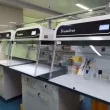As the world population continues to grow and resources become increasingly scarce, the future of food is a pressing concern for many. With the rise of technology and the demand for more sustainable practices, the food industry is rapidly evolving. In this article, we will explore some of the latest innovations in agriculture and nutrition that are shaping the future of food.
One of the biggest trends in agriculture is the use of precision farming techniques. This involves using technology such as drones, sensors, and GPS mapping to optimize crop yields and reduce waste. Precision farming allows farmers to more accurately monitor the health of their crops, detect pests and diseases early, and apply fertilizers and pesticides more efficiently. This not only leads to higher yields but also helps reduce the environmental impact of farming by reducing the amount of chemicals and water used.
Another area of innovation in agriculture is the development of alternative protein sources. With concerns over the environmental impact of meat production, companies are investing in plant-based proteins and lab-grown meats as sustainable alternatives. Plant-based meat substitutes have become increasingly popular in recent years, with major fast-food chains introducing vegetarian options to their menus. Meanwhile, lab-grown meat is still in its early stages but has the potential to revolutionize the industry by providing a more sustainable and ethical way to produce meat.
In the area of nutrition, personalized diets and nutrigenomics are two emerging trends. Personalized diets involve tailoring diets to an individual’s unique genetic makeup, lifestyle, and health goals. This involves analyzing genetic data and other factors such as gut microbiome to create a customized nutrition plan. Nutrigenomics, on the other hand, is the study of how individual genes affect a person’s response to nutrients. This field has the potential to help develop more targeted and effective dietary interventions for a range of health conditions.
In addition to these specific innovations, the future of food also involves a greater focus on sustainability and reducing waste. This includes efforts to reduce food waste at all stages of the supply chain, from production to consumption. It also involves a greater emphasis on regenerative agriculture practices, which aim to restore soil health and promote biodiversity.
As the world population continues to grow and resources become more scarce, the food industry will need to continue to innovate and adapt in order to meet the demand for food in a sustainable and ethical way. These emerging technologies and trends provide a glimpse into what the future of food may look like.












